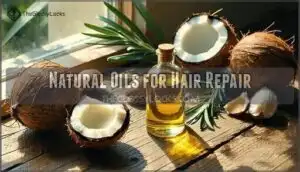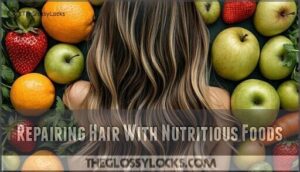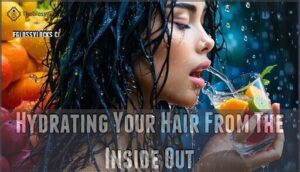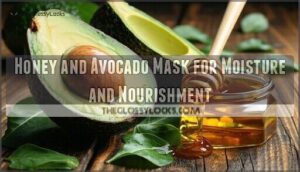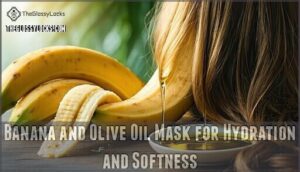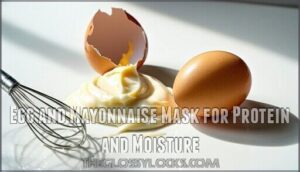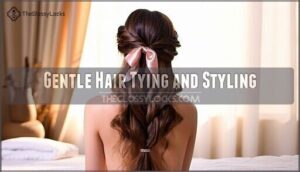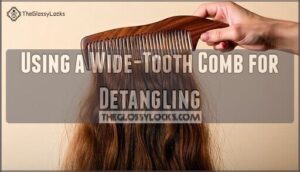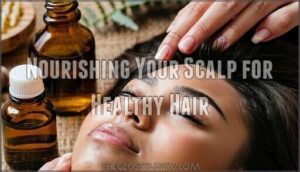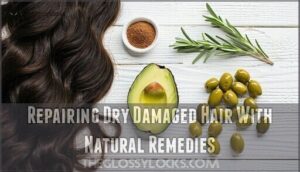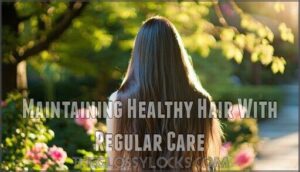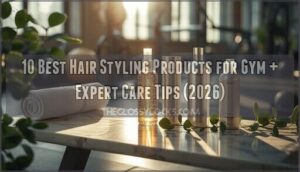This site is supported by our readers. We may earn a commission, at no cost to you, if you purchase through links.
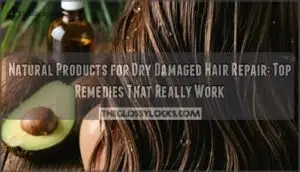
Using coconut oil, argan oil, and olive oil can help nourish and hydrate your hair.
You can also try DIY hair masks with ingredients like honey, avocado, and banana.
These natural remedies can help repair and restore your hair’s health, leading to softer and shinier locks – and that’s just the beginning of your hair transformation journey.
Table Of Contents
- Key Takeaways
- Signs of Dry Damaged Hair
- Natural Oils for Hair Repair
- Repairing Hair With Nutritious Foods
- Hydrating Your Hair From The Inside Out
- DIY Hair Masks for Dry Damaged Hair
- Protective Styling for Dry Damaged Hair
- Nourishing Your Scalp for Healthy Hair
- Minimizing Chemical Damage to Hair
- Repairing Dry Damaged Hair With Natural Remedies
- Maintaining Healthy Hair With Regular Care
- Frequently Asked Questions (FAQs)
- What is the best natural treatment for dry damaged hair?
- How can I make my dry, damaged hair healthy again?
- How do I rehydrate my hair naturally?
- How long does it take to repair dry hair?
- Can hormonal changes affect hair dryness and damage?
- Are there specific hairstyles that worsen dry hair?
- How does hard water impact hair dryness?
- Can certain medications contribute to dry, damaged hair?
- Can aloe vera gel repair dry hair?
- Does rosemary oil promote hair growth?
- Conclusion
Key Takeaways
- You’ll find that using natural products like coconut oil, argan oil, and olive oil can help nourish and hydrate your dry damaged hair, making it softer and shinier.
- To repair your dry, damaged hair, you can try DIY hair masks with ingredients like honey, avocado, and banana, which provide moisture and nourishment, and protection.
- You can also promote hair growth and strength by eating foods rich in omega-3, antioxidants, and vitamins, and by drinking plenty of water to hydrate your hair from the inside out.
- By adopting a protective styling routine, minimizing chemical damage, and using gentle hair care products, you’ll be able to prevent breakage, reduce frizz, and achieve healthier, more resilient hair over time.
Signs of Dry Damaged Hair
You might notice your hair snapping, frizzing up, or looking dull even after you’ve tried all sorts of products, and sometimes it feels like no amount of brushing can tame those wild strands.
Dry damaged hair can be frustrating and hard to tame
If split ends and a brittle texture are becoming your new normal, your hair’s sending a clear SOS for some repair and TLC.
Breakage and Frizz
Noticing breakage and frizz getting out of hand? Your hair’s sounding the alarm for help.
Watch out for:
- Never-ending frizz, like a bad hair day on repeat
- Unruly tangles that refuse to cooperate
- Splitting ends sneaking up on you
- Brittle hair that snaps when brushing
Humidity Effects and lack of Hydration Importance often fuel frizzy hair. Try natural hair repair for better Breakage Prevention. Lack of hydration can lead to frizzy hair.
Lacking Shine and Luster
If your hair’s lost its sparkle, you’re not alone.
Dullness usually means your cuticle health is suffering—from product buildup, porosity issues, or damage stealing away that natural sheen.
Try a gentle, weekly natural hair mask made with natural ingredients for hair shine and repair.
These boost light reflection, helping dry damaged hair get back its healthy, mirror-gloss glow.
Unmanageable and Brittle Texture
If your strands feel more straw than silk, you’re not alone.
Dry, brittle texture often shows up when hair’s thirsty and needs a boost in hydration methods and protein treatments.
Look for natural hair remedies that nourish your scalp and improve elasticity.
With the right texture improvement steps, you’ll help prevent hair breakage and enjoy softer, stronger locks.
Split Ends and Frayed Hair
Split ends can make your hair look worn out and frayed—like an old rope at the docks.
Common causes of splits include heat styling and rough brushing.
Preventing fraying starts with hydrating regularly and booking trims every 6-8 weeks.
For split-end repair, try natural hair remedies like deep conditioning or avocado masks.
Consistent dry hair solutions make damaged hair treatment much easier.
Natural Oils for Hair Repair
You’ll find that natural oils like coconut, olive, and argan go beyond simply coating your hair—they penetrate deep to repair and protect each strand.
If your hair’s been through a little too much sun, styling, or stress, these tried-and-true oils are your shortcut back to smoother, stronger locks.
Coconut Oil for Nourishment and Hydration
You can use coconut oil to nourish and hydrate dry damaged hair.
Apply it as a pre-shampoo treatment or use it to control dandruff, benefiting from its moisturizing properties and natural ingredients for effective dry damaged hair repair, suitable for various hair types.
Many users find added benefits here.
Olive Oil for Moisture and Protection
Now that you understand coconut oil benefits, let’s explore olive oil for hair moisture and protection.
It’s another fantastic natural ingredient for dry damaged hair repair!
Here’s how you can incorporate an olive oil treatment into your routine:
- Pre-Shampoo Boost: Apply olive oil 30 minutes before washing your hair.
- Mask Magic: Mix olive oil with honey for a super hydrating hair repair mask.
- Leave-In Love: Smooth a tiny bit on ends to protect from heat.
With the right application techniques, you’ll see amazing results!
Argan Oil for Shine and Softness
You can harness Argan benefits for hair shine and softness.
| Method | Benefit |
|---|---|
| Apply to ends | Hydrates |
| Mix with coconut | Repairs |
| Pre-shampoo | Boosts shine |
| Overnight | Protects color |
| Scalp massage | Stimulates growth |
The methods outlined provide various benefits, including hydration, repair, boosting shine, protecting color, and stimulating growth.
Repairing Hair With Nutritious Foods
You can repair your dry, damaged hair by incorporating nutritious foods into your diet, which provide essential vitamins and minerals for hair health.
By eating foods rich in omega-3, antioxidants, and vitamins, you’ll be giving your hair the nutrients it needs to grow strong and healthy.
Omega-3 Rich Foods for Hair Growth
You can boost hair growth with omega-3 rich foods like
- Fatty fish
- Flaxseeds
- Walnuts, which provide omega-3 benefits for damaged hair repair and natural hair treatments, promoting healthy hair growth and dry damaged hair repair with omega3s.
These supplements can increase hair diameter to support healthy hair growth.
Antioxidant-Rich Foods for Hair Protection
With every bite of colorful produce—think berries, leafy greens, and nuts—you’re fighting free radical damage that ages and weakens your hair.
These Vitamin E sources, plus selenium and zinc, bring powerful antioxidants to your daily meals, supporting natural hair treatments from the inside out.
Eat fatty fish for follicle strength and scalp health, and watch hair repair get easier, even for dry damaged hair.
To boost hair health, consider omega-3 fatty acids from foods like salmon.
Incorporating foods rich in biotin and zinc can further strengthen hair follicles.
Vitamin and Mineral-Rich Foods for Hair Health
You can nourish your hair with vitamin and mineral-rich foods.
- Spinach for iron
- Almonds for biotin
- Sweet potatoes for vitamin A
- Avocados for healthy fats
- Oysters for zinc, promoting hair health and repair, while addressing mineral deficiencies and supporting vitamin absorption.
Hydrating Your Hair From The Inside Out
Your hair’s hydration starts from within, and what you drink and eat directly impacts your strands’ moisture levels.
Hydrate from the inside out for healthy hair
Proper internal hydration creates the foundation for healthy, resilient hair that can better withstand damage and environmental stressors, leading to resilient hair overall.
Drinking Plenty of Water for Hair Hydration
Your hair needs water intake just like your body does.
Proper hydration benefits start from within, delivering cellular hydration to your scalp and strands.
When you’re dehydrated, your scalp moisture drops, making dry hair and damaged hair worse.
Good hair elasticity depends on consistent hydration – aim for eight glasses daily to support hair health and prevent brittle, breaking strands.
Adequate hydration also reduces split ends and breakage.
Eating Hydrating Foods for Hair Health
To supercharge your hair health, focus on foods rich in water content and electrolytes.
Here are some top picks:
- Watermelon (92% water)
- Cantaloupe (90% water)
- Cucumbers (96% water)
- Carrots (87% water)
- Celery (95% water)
These hydrating foods support mineral absorption, providing essential vitamins and minerals for healthy hair.
Avoiding Dehydrating Foods for Hair
Now that you’re fueling your locks with hydrating foods, it’s time to cut out the culprits that dry them out.
Limit or avoid:
- Sugary treats and drinks that suck moisture from your hair
- Salty and processed foods that strip your locks of their natural oils
- Excessive caffeine and alcohol that dry out your tresses
DIY Hair Masks for Dry Damaged Hair
You can repair and restore your dry, damaged hair with the right DIY hair masks, and we’re about to share some of the most effective and easy-to-make recipes using natural ingredients.
From hydrating honey and avocado masks to nourishing banana and olive oil treatments, these homemade hair masks will help you achieve the healthy, shiny locks you’ve always wanted.
Honey and Avocado Mask for Moisture and Nourishment
You can whip up a fantastic honey avocado hair mask. It’s great for moisturizing dry damaged hair. You’ll need ripe avocado and honey.
This DIY hair mask is easy! Mash the avocado and mix in honey. Apply to your hair, wait 15-20 minutes, and rinse.
For specialized ingredients, you can find products for DIY avocado hair masks.
Hello, silky hair!
| Aspect | Details |
|---|---|
| Mask Application | Apply evenly to damp hair. |
| Ingredient Benefits | Avocado moisturizes; honey adds shine. |
| DIY Variations | Add yogurt for extra protein. |
| Honey Types | Manuka honey for extra benefits. |
| Avocado Selection | Use ripe, soft avocados. |
Banana and Olive Oil Mask for Hydration and Softness
Ready to transform your dry, damaged locks? Let’s talk about the incredible benefits of a banana and olive oil mask. This dynamic duo is packed with antioxidants, vitamins, and fatty acids that will leave your hair ridiculously soft and supple.
To get started, mash a ripe banana and mix it with 2 tablespoons of olive oil. Apply the mask to your hair, from roots to ends, and leave it on for 15-20 minutes. Some users find banana hair products particularly effective.
Here’s what you can expect:
- Hydrated hair that’s soft to the touch
- Reduced frizz and flyaways
- A healthy shine that lasts all day
Egg and Mayonnaise Mask for Protein and Moisture
Crack open an egg and whip up a protein-packed mask with mayonnaise! Rich in protein and moisture, this DIY duo nourishes dry locks.
Mix one egg with two tablespoons of mayonnaise and apply for 15-20 minutes. Rinse for silky, strong hair.
The protein benefits of egg yolk and mayonnaise properties make this mask a damaged hair treatment winner. This mask can help strengthen follicles and build damage resistance.
Protective Styling for Dry Damaged Hair
To repair dry, damaged hair, you’ll want to adopt a protective styling routine that minimizes breakage and promotes moisture retention.
By making a few simple changes to your daily hair care routine, such as using a wide-tooth comb and avoiding heat styling, you can help your hair recover from damage.
This will allow your hair to regain its natural shine and softness.
Gentle Hair Tying and Styling
Now that you’ve mastered DIY hair masks, let’s explore gentle hair tying and styling. It’s time to liberate your locks from harsh elastics and tight styles.
- Use silk scrunchies to minimize hair creasing.
- Opt for loose ponytails or Braid variations to reduce hair tension.
- Try styles that don’t require tight hair ties.
- Use silk scarves to gently tie your hair back.
- Avoid hair ties with metal parts that can cause hair breakage.
Avoiding tension will improve hair elasticity and hair strength. Remember, gentle hair care reduces hair damage! For further repair, consider peptide treatments for hair. Soft elastics are your friend.
Using a Wide-Tooth Comb for Detangling
When detangling damaged hair treatment, choose wide-tooth combs over fine-tooth versions. The comb material matters—plastic or wood prevents static buildup.
Your detangling technique should start from ends, working upward in small sections. Sectioning hair makes the process manageable and reduces hair breakage. Always detangle wet hair with conditioner for slip. Wide-toothed combs glide through knots without forcing.
Clean your comb regularly for proper comb maintenance and ideal hair detangling results.
Comb Type Tooth Width Best For
Avoiding Heat Styling and Harsh Chemicals
You can ditch heat styling and harsh chemicals by trying heatless styling and opting for chemical-free products.
Like natural dyes and sulfate alternatives, to repair damaged hair with gentle detangling and homemade hair treatments, including hair masks for natural hair care and hair repair.
Nourishing Your Scalp for Healthy Hair
You can take the first step for healthy hair by nourishing your scalp, which is essential for hair growth and strength.
By massaging your scalp, using a boar-bristle brush, and eating foods rich in healthy fats, you’re helping to create a healthy environment for your hair to thrive.
Massaging Your Scalp for Blood Flow and Growth
You can boost hair growth by massaging your scalp.
Try these techniques:
- Using rosemary oil for infusion
- Focusing on pressure points
- Practicing scalp exfoliation
Massaging with moderate pressure for hair circulation and scalp health, promoting hair growth and hair loss prevention.
Using a Boar-Bristle Brush for Scalp Stimulation
You can stimulate your scalp with a boar-bristle brush, promoting hair growth and circulation benefits.
This technique also helps reduce dandruff, aiding in dry hair repair and overall scalp health, making it a great natural product for hair damage prevention and hair repair.
Eating Foods Rich in Healthy Fats for Scalp Health
You can nourish your scalp with foods rich in healthy fats like avocados and salmon, promoting hair growth and scalp hydration through omega benefits and fatty acids.
Supporting overall hair health with dietary changes and nutrient absorption is crucial for maintaining a healthy scalp.
Minimizing Chemical Damage to Hair
If you want to keep your hair healthy, it’s smart to limit harsh chemicals and go for gentler products.
Your hair will thank you later—no one enjoys a bad hair day that lasts for weeks.
Limiting Chemical Treatments and Processes
Chemical treatments can turn even the healthiest hair into a tumbleweed.
Give your hair a break with these simple habits:
- Space out salon visits for less chemical exposure
- Swap to sulfate-free shampoos for gentle cleansing
- Try natural hair dyes over harsh chemicals
- Pick DIY hair lightening for minimal damage
- Explore chemical relaxers alternatives
Your hair repair journey starts here!
Choosing Gentle Hair Care Products
You’re switching to gentle hair care.
Opt for sulfate-free shampoos and natural conditioners, considering your hair type and scalp sensitivity.
| Product Ingredients | Benefits |
|---|---|
| Natural Oils | Hydrate dry damaged hair |
| Plant Extracts | Soothe scalp |
| Gentle Detangling | Reduce breakage |
Avoiding Harsh Chemicals and Dyes
You can avoid harsh chemicals by using natural alternatives, like DIY dyes and sulfate-free products.
Consider these options:
- Gentle shampoos
- Ammonia-free dyes
- Natural hair treatments
- Sulfate-free conditioners to repair dry damaged hair with natural products.
Repairing Dry Damaged Hair With Natural Remedies
You can repair dry damaged hair with natural remedies that provide moisture, nourishment, and protection.
By using natural products like coconut oil, olive oil, and avocado, you can strengthen and restore your hair’s health, reducing breakage and frizz.
Using Black Tea for Shine and Softness
Black tea transforms dull, damaged hair into silky strands.
Steep 3-4 tea bags in boiling water, cool completely, then pour over clean hair.
The tannin benefits include sealed cuticles and enhanced hair shine. Leave for 15-30 minutes before rinsing.
Weekly rinse frequency works best for most hair types, delivering noticeable hair softness and natural hair repair.
Applying Apple Cider Vinegar for Balance and Shine
Your hair’s pH balance is everything, and apple cider vinegar delivers the perfect reset.
This powerhouse ingredient tackles buildup while sealing your cuticles for serious shine. ACV dilution is key—mix one part vinegar with three parts water for ideal scalp pH restoration.
- Rinse technique: Apply diluted ACV after shampooing, massage gently, then rinse thoroughly
- Frizz reduction: Weekly treatments smooth damaged cuticles and eliminate flyaways naturally
- ACV benefits: Removes product residue while boosting hair shine and manageability instantly
Using Aloe Vera for Hydration and Soothing
Nature’s hydrating hero, aloe vera, delivers serious moisture to dry damaged hair while soothing irritated scalps.
This cooling gel penetrates deeply, repairing UV damage and restoring shine.
Simply smooth pure aloe vera gel onto damp strands after washing.
The scalp soothing properties calm inflammation while moisturizing each strand.
Your hair repair routine just got simpler.
Maintaining Healthy Hair With Regular Care
Caring for your hair isn’t a one-time fix—it’s about sticking to simple habits, like using a silk pillowcase, eating balanced meals, and scheduling regular trims.
When you treat your hair with steady attention, it’ll pay you back with strength, shine, and fewer bad hair days.
Getting Regular Trims for Hair Health
To prevent split ends, trim your hair every 6-8 weeks. This promotes hair growth and hair health.
- Trim Frequency
- Split End Prevention
- Hair Growth Impact
- Styling After Trims
- Professional vs DIY
Using a Silk Pillowcase for Reduced Friction
Swap your cotton pillowcase for a silk one to reduce friction and hair breakage.
Silk benefits include friction reduction, promoting healthy hair and skin hydration.
Using a silk pillowcase can help repair dry damaged hair by minimizing breakage and tangles, making it a simple yet effective hair care tip.
Eating a Balanced Diet for Overall Hair Health
After sleeping on silk, what’s next? Your hair’s health begins with your food. Load up on hair-healthy foods.
Don’t skimp on protein intake, even if you’re vegan. Remember, vitamin deficiencies can lead to lackluster locks. Think of your hair diet as its personal chef!
- Hydration effects
- Mineral absorption
- Gut health
- Hair vitamins and hair minerals
Frequently Asked Questions (FAQs)
What is the best natural treatment for dry damaged hair?
You can try a coconut oil mask or an avocado and olive oil treatment to deeply nourish and moisturize your dry, damaged hair, promoting healthy growth and repair.
How can I make my dry, damaged hair healthy again?
In the heat of the moment, nourish your locks with coconut oil, avocado, and olive oil to revive dry, damaged hair and make it healthy again naturally.
How do I rehydrate my hair naturally?
You can rehydrate your hair naturally by using masks with ingredients like avocado, olive oil, and honey, which lock in moisture and nourish damaged strands effectively.
How long does it take to repair dry hair?
You’ll set out on a hair revival journey, and with consistent care, it can take several weeks to a few months to noticeably repair dry, damaged hair.
It can achieve silky locks.
Can hormonal changes affect hair dryness and damage?
You may experience dry, damaged hair due to hormonal changes, as they can alter your hair’s growth cycle and oil production, leading to dryness and damage over time naturally.
Are there specific hairstyles that worsen dry hair?
Cutting to the chase, you’ll find that tight hairstyles, like braids or ponytails, can worsen dry hair by causing breakage and tension on your locks, so try loosening up.
How does hard water impact hair dryness?
You’ll notice hard water can strip your hair of its natural oils, leading to increased dryness and damage over time.
Making it essential to use a water filter or clarifying shampoo.
Can certain medications contribute to dry, damaged hair?
You should know certain medications, like those for thyroid issues or depression, can contribute to dry, damaged hair due to their chemical effects on your body’s hormone balance.
Can aloe vera gel repair dry hair?
Like a soothing balm, you’ll find aloe vera gel can gently repair dry hair, providing hydration and nourishment to damaged locks with its rich, vitamin-packed goodness, helping to restore moisture.
Does rosemary oil promote hair growth?
You’ll find rosemary oil stimulates follicles, promoting longer, stronger hair growth, and tackles dandruff, making it a great addition to your hair care routine for healthier locks.
Conclusion
Discover your hair’s potential with natural products for dry damaged hair repair.
You’ll discover a treasure trove of remedies, from coconut oil to DIY masks.
By incorporating these natural products for dry damaged hair repair into your routine, you’ll be on your way to softer, shinier locks, and a healthier hair journey, using natural products for dry damaged hair repair that really work for you.

